Reflective Essay: Paramedic Emergency Clinical Placement, Module 1
VerifiedAdded on 2019/12/28
|16
|4940
|3833
Essay
AI Summary
This reflective essay, written by a paramedic student, details a significant event encountered during a clinical placement in emergency care. The essay follows the Gibbs model of reflection, analyzing a specific emergency call where the student, acting as a solo rapid response paramedic, faced a patient in critical condition. The essay explores the ethical, legal, and emotional aspects of the situation, including the patient's medical history, the family's concerns, and the complexities surrounding end-of-life decisions and DNAR protocols. The student reflects on their actions, the limitations of the situation, and the impact of the experience, including the challenges of working as a solo resource. The essay provides a detailed account of the incident, including the student's assessment, the involvement of the ambulance backup, and the discussions with the patient's family. The author uses pseudonyms to maintain patient confidentiality and discusses the importance of reflective practice in paramedic training and professional development. The essay concludes with an analysis of the event, drawing lessons for future practice and highlighting the importance of self-awareness and ethical considerations in emergency medical care. The essay is a valuable resource for students and professionals in the field of emergency medicine.
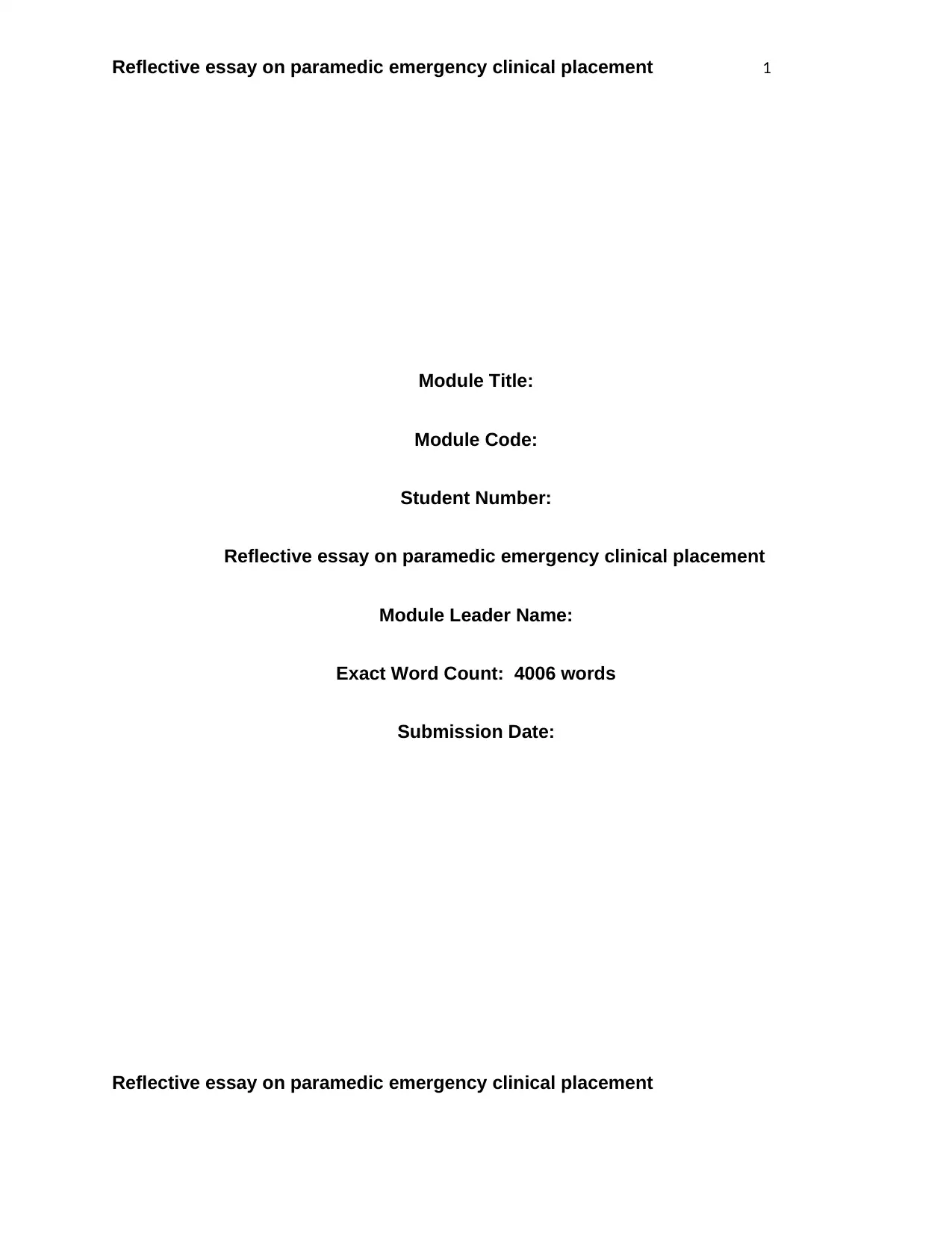
Reflective essay on paramedic emergency clinical placement 1
Module Title:
Module Code:
Student Number:
Reflective essay on paramedic emergency clinical placement
Module Leader Name:
Exact Word Count: 4006 words
Submission Date:
Reflective essay on paramedic emergency clinical placement
Module Title:
Module Code:
Student Number:
Reflective essay on paramedic emergency clinical placement
Module Leader Name:
Exact Word Count: 4006 words
Submission Date:
Reflective essay on paramedic emergency clinical placement
Paraphrase This Document
Need a fresh take? Get an instant paraphrase of this document with our AI Paraphraser
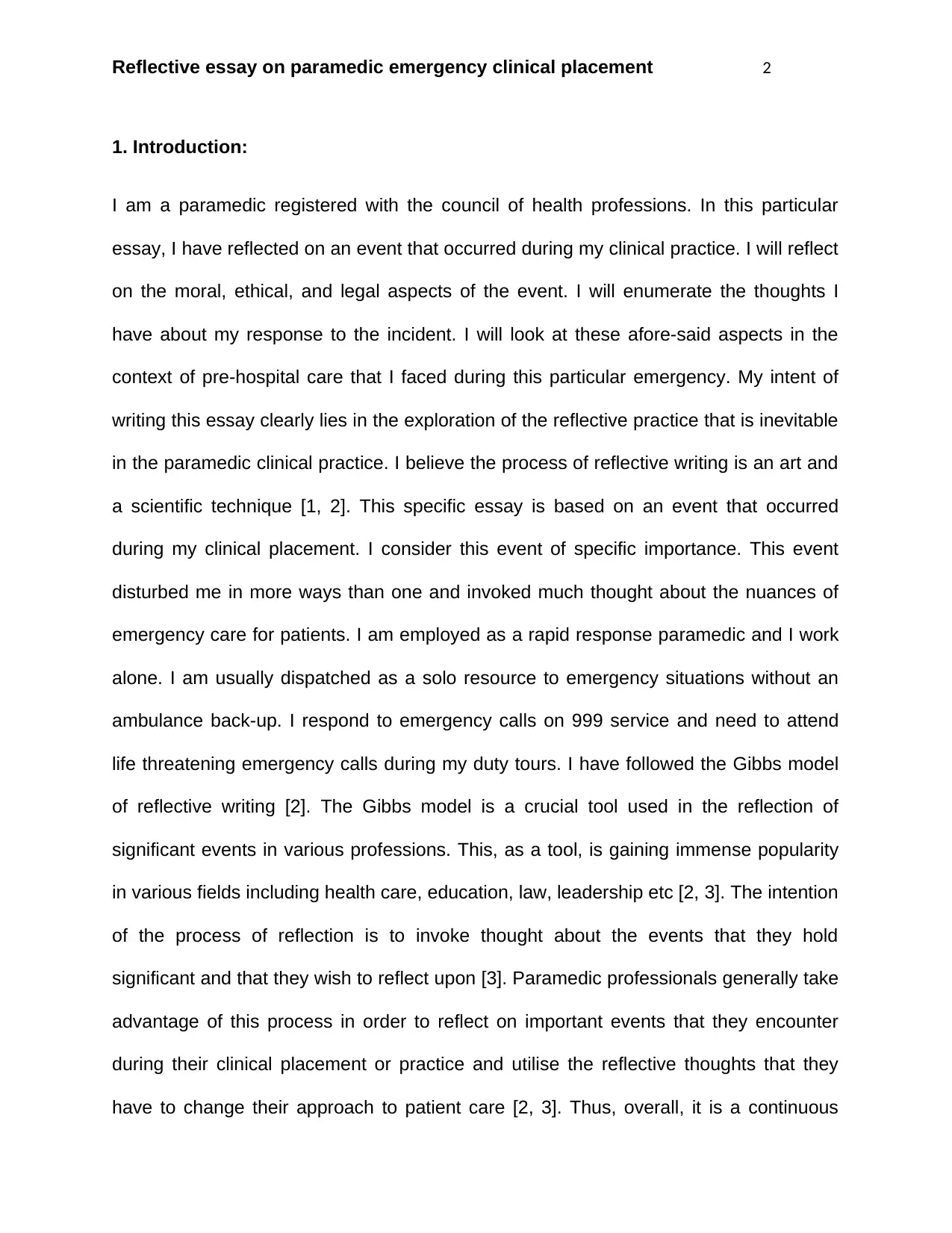
Reflective essay on paramedic emergency clinical placement 2
1. Introduction:
I am a paramedic registered with the council of health professions. In this particular
essay, I have reflected on an event that occurred during my clinical practice. I will reflect
on the moral, ethical, and legal aspects of the event. I will enumerate the thoughts I
have about my response to the incident. I will look at these afore-said aspects in the
context of pre-hospital care that I faced during this particular emergency. My intent of
writing this essay clearly lies in the exploration of the reflective practice that is inevitable
in the paramedic clinical practice. I believe the process of reflective writing is an art and
a scientific technique [1, 2]. This specific essay is based on an event that occurred
during my clinical placement. I consider this event of specific importance. This event
disturbed me in more ways than one and invoked much thought about the nuances of
emergency care for patients. I am employed as a rapid response paramedic and I work
alone. I am usually dispatched as a solo resource to emergency situations without an
ambulance back-up. I respond to emergency calls on 999 service and need to attend
life threatening emergency calls during my duty tours. I have followed the Gibbs model
of reflective writing [2]. The Gibbs model is a crucial tool used in the reflection of
significant events in various professions. This, as a tool, is gaining immense popularity
in various fields including health care, education, law, leadership etc [2, 3]. The intention
of the process of reflection is to invoke thought about the events that they hold
significant and that they wish to reflect upon [3]. Paramedic professionals generally take
advantage of this process in order to reflect on important events that they encounter
during their clinical placement or practice and utilise the reflective thoughts that they
have to change their approach to patient care [2, 3]. Thus, overall, it is a continuous
1. Introduction:
I am a paramedic registered with the council of health professions. In this particular
essay, I have reflected on an event that occurred during my clinical practice. I will reflect
on the moral, ethical, and legal aspects of the event. I will enumerate the thoughts I
have about my response to the incident. I will look at these afore-said aspects in the
context of pre-hospital care that I faced during this particular emergency. My intent of
writing this essay clearly lies in the exploration of the reflective practice that is inevitable
in the paramedic clinical practice. I believe the process of reflective writing is an art and
a scientific technique [1, 2]. This specific essay is based on an event that occurred
during my clinical placement. I consider this event of specific importance. This event
disturbed me in more ways than one and invoked much thought about the nuances of
emergency care for patients. I am employed as a rapid response paramedic and I work
alone. I am usually dispatched as a solo resource to emergency situations without an
ambulance back-up. I respond to emergency calls on 999 service and need to attend
life threatening emergency calls during my duty tours. I have followed the Gibbs model
of reflective writing [2]. The Gibbs model is a crucial tool used in the reflection of
significant events in various professions. This, as a tool, is gaining immense popularity
in various fields including health care, education, law, leadership etc [2, 3]. The intention
of the process of reflection is to invoke thought about the events that they hold
significant and that they wish to reflect upon [3]. Paramedic professionals generally take
advantage of this process in order to reflect on important events that they encounter
during their clinical placement or practice and utilise the reflective thoughts that they
have to change their approach to patient care [2, 3]. Thus, overall, it is a continuous
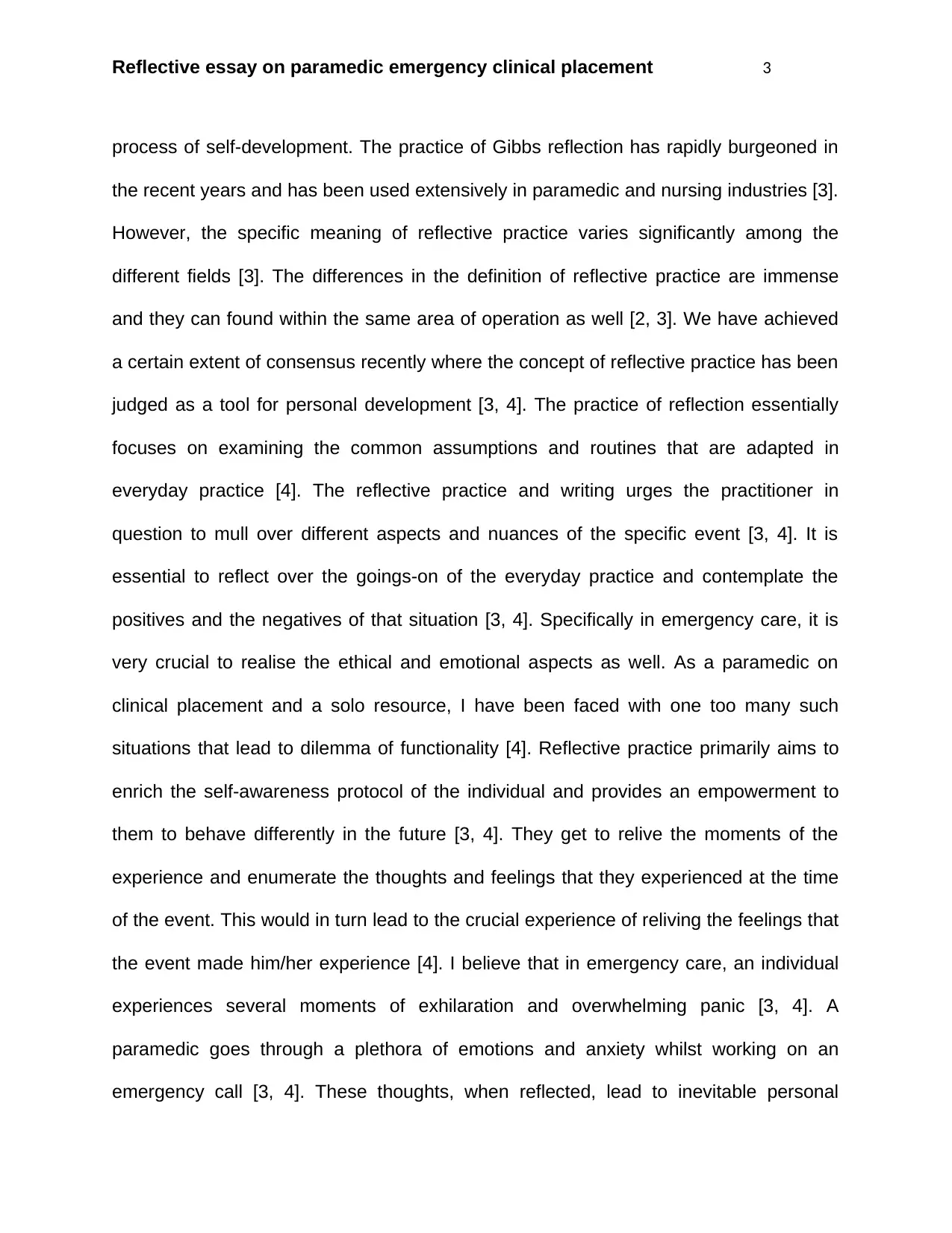
Reflective essay on paramedic emergency clinical placement 3
process of self-development. The practice of Gibbs reflection has rapidly burgeoned in
the recent years and has been used extensively in paramedic and nursing industries [3].
However, the specific meaning of reflective practice varies significantly among the
different fields [3]. The differences in the definition of reflective practice are immense
and they can found within the same area of operation as well [2, 3]. We have achieved
a certain extent of consensus recently where the concept of reflective practice has been
judged as a tool for personal development [3, 4]. The practice of reflection essentially
focuses on examining the common assumptions and routines that are adapted in
everyday practice [4]. The reflective practice and writing urges the practitioner in
question to mull over different aspects and nuances of the specific event [3, 4]. It is
essential to reflect over the goings-on of the everyday practice and contemplate the
positives and the negatives of that situation [3, 4]. Specifically in emergency care, it is
very crucial to realise the ethical and emotional aspects as well. As a paramedic on
clinical placement and a solo resource, I have been faced with one too many such
situations that lead to dilemma of functionality [4]. Reflective practice primarily aims to
enrich the self-awareness protocol of the individual and provides an empowerment to
them to behave differently in the future [3, 4]. They get to relive the moments of the
experience and enumerate the thoughts and feelings that they experienced at the time
of the event. This would in turn lead to the crucial experience of reliving the feelings that
the event made him/her experience [4]. I believe that in emergency care, an individual
experiences several moments of exhilaration and overwhelming panic [3, 4]. A
paramedic goes through a plethora of emotions and anxiety whilst working on an
emergency call [3, 4]. These thoughts, when reflected, lead to inevitable personal
process of self-development. The practice of Gibbs reflection has rapidly burgeoned in
the recent years and has been used extensively in paramedic and nursing industries [3].
However, the specific meaning of reflective practice varies significantly among the
different fields [3]. The differences in the definition of reflective practice are immense
and they can found within the same area of operation as well [2, 3]. We have achieved
a certain extent of consensus recently where the concept of reflective practice has been
judged as a tool for personal development [3, 4]. The practice of reflection essentially
focuses on examining the common assumptions and routines that are adapted in
everyday practice [4]. The reflective practice and writing urges the practitioner in
question to mull over different aspects and nuances of the specific event [3, 4]. It is
essential to reflect over the goings-on of the everyday practice and contemplate the
positives and the negatives of that situation [3, 4]. Specifically in emergency care, it is
very crucial to realise the ethical and emotional aspects as well. As a paramedic on
clinical placement and a solo resource, I have been faced with one too many such
situations that lead to dilemma of functionality [4]. Reflective practice primarily aims to
enrich the self-awareness protocol of the individual and provides an empowerment to
them to behave differently in the future [3, 4]. They get to relive the moments of the
experience and enumerate the thoughts and feelings that they experienced at the time
of the event. This would in turn lead to the crucial experience of reliving the feelings that
the event made him/her experience [4]. I believe that in emergency care, an individual
experiences several moments of exhilaration and overwhelming panic [3, 4]. A
paramedic goes through a plethora of emotions and anxiety whilst working on an
emergency call [3, 4]. These thoughts, when reflected, lead to inevitable personal
⊘ This is a preview!⊘
Do you want full access?
Subscribe today to unlock all pages.

Trusted by 1+ million students worldwide
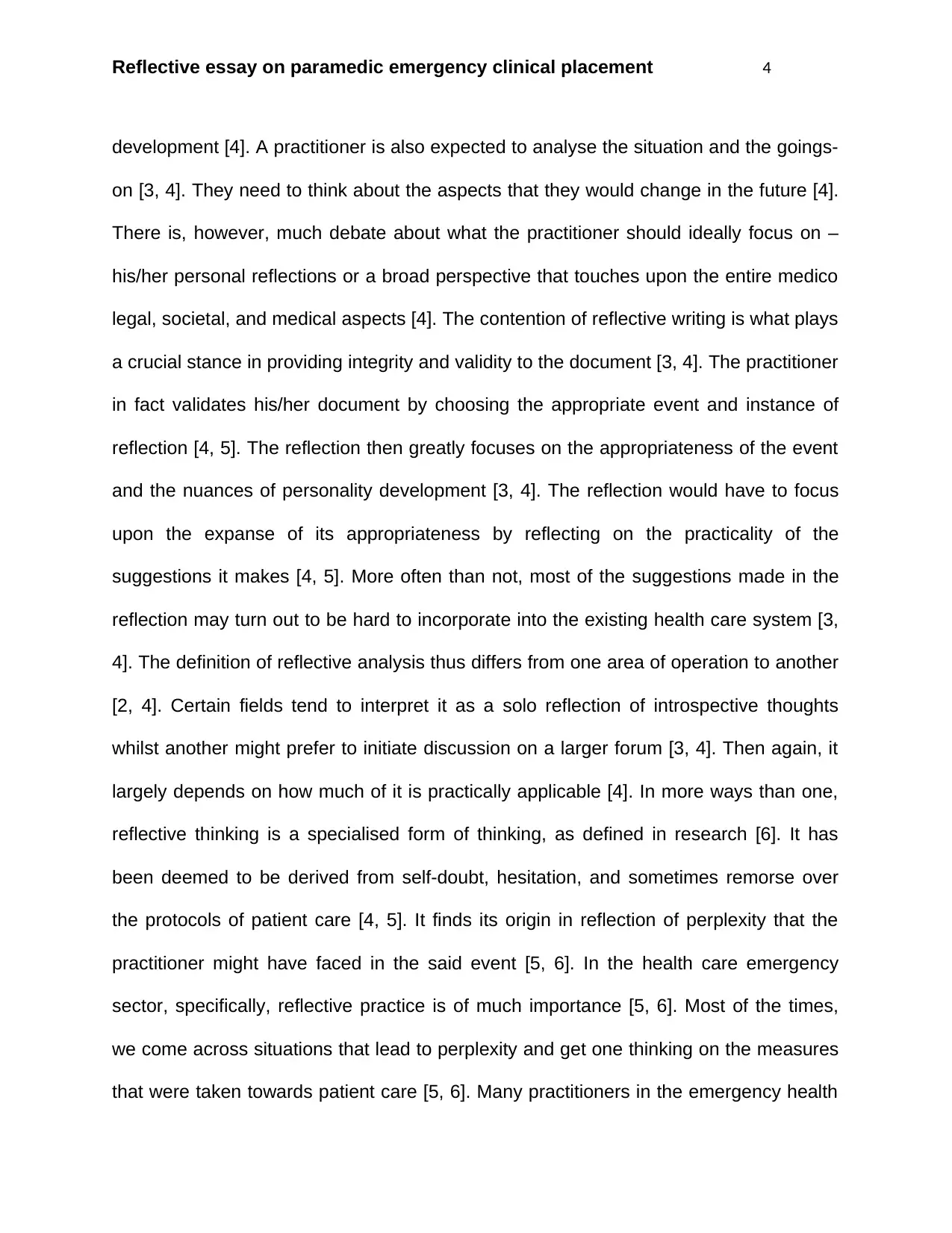
Reflective essay on paramedic emergency clinical placement 4
development [4]. A practitioner is also expected to analyse the situation and the goings-
on [3, 4]. They need to think about the aspects that they would change in the future [4].
There is, however, much debate about what the practitioner should ideally focus on –
his/her personal reflections or a broad perspective that touches upon the entire medico
legal, societal, and medical aspects [4]. The contention of reflective writing is what plays
a crucial stance in providing integrity and validity to the document [3, 4]. The practitioner
in fact validates his/her document by choosing the appropriate event and instance of
reflection [4, 5]. The reflection then greatly focuses on the appropriateness of the event
and the nuances of personality development [3, 4]. The reflection would have to focus
upon the expanse of its appropriateness by reflecting on the practicality of the
suggestions it makes [4, 5]. More often than not, most of the suggestions made in the
reflection may turn out to be hard to incorporate into the existing health care system [3,
4]. The definition of reflective analysis thus differs from one area of operation to another
[2, 4]. Certain fields tend to interpret it as a solo reflection of introspective thoughts
whilst another might prefer to initiate discussion on a larger forum [3, 4]. Then again, it
largely depends on how much of it is practically applicable [4]. In more ways than one,
reflective thinking is a specialised form of thinking, as defined in research [6]. It has
been deemed to be derived from self-doubt, hesitation, and sometimes remorse over
the protocols of patient care [4, 5]. It finds its origin in reflection of perplexity that the
practitioner might have faced in the said event [5, 6]. In the health care emergency
sector, specifically, reflective practice is of much importance [5, 6]. Most of the times,
we come across situations that lead to perplexity and get one thinking on the measures
that were taken towards patient care [5, 6]. Many practitioners in the emergency health
development [4]. A practitioner is also expected to analyse the situation and the goings-
on [3, 4]. They need to think about the aspects that they would change in the future [4].
There is, however, much debate about what the practitioner should ideally focus on –
his/her personal reflections or a broad perspective that touches upon the entire medico
legal, societal, and medical aspects [4]. The contention of reflective writing is what plays
a crucial stance in providing integrity and validity to the document [3, 4]. The practitioner
in fact validates his/her document by choosing the appropriate event and instance of
reflection [4, 5]. The reflection then greatly focuses on the appropriateness of the event
and the nuances of personality development [3, 4]. The reflection would have to focus
upon the expanse of its appropriateness by reflecting on the practicality of the
suggestions it makes [4, 5]. More often than not, most of the suggestions made in the
reflection may turn out to be hard to incorporate into the existing health care system [3,
4]. The definition of reflective analysis thus differs from one area of operation to another
[2, 4]. Certain fields tend to interpret it as a solo reflection of introspective thoughts
whilst another might prefer to initiate discussion on a larger forum [3, 4]. Then again, it
largely depends on how much of it is practically applicable [4]. In more ways than one,
reflective thinking is a specialised form of thinking, as defined in research [6]. It has
been deemed to be derived from self-doubt, hesitation, and sometimes remorse over
the protocols of patient care [4, 5]. It finds its origin in reflection of perplexity that the
practitioner might have faced in the said event [5, 6]. In the health care emergency
sector, specifically, reflective practice is of much importance [5, 6]. Most of the times,
we come across situations that lead to perplexity and get one thinking on the measures
that were taken towards patient care [5, 6]. Many practitioners in the emergency health
Paraphrase This Document
Need a fresh take? Get an instant paraphrase of this document with our AI Paraphraser
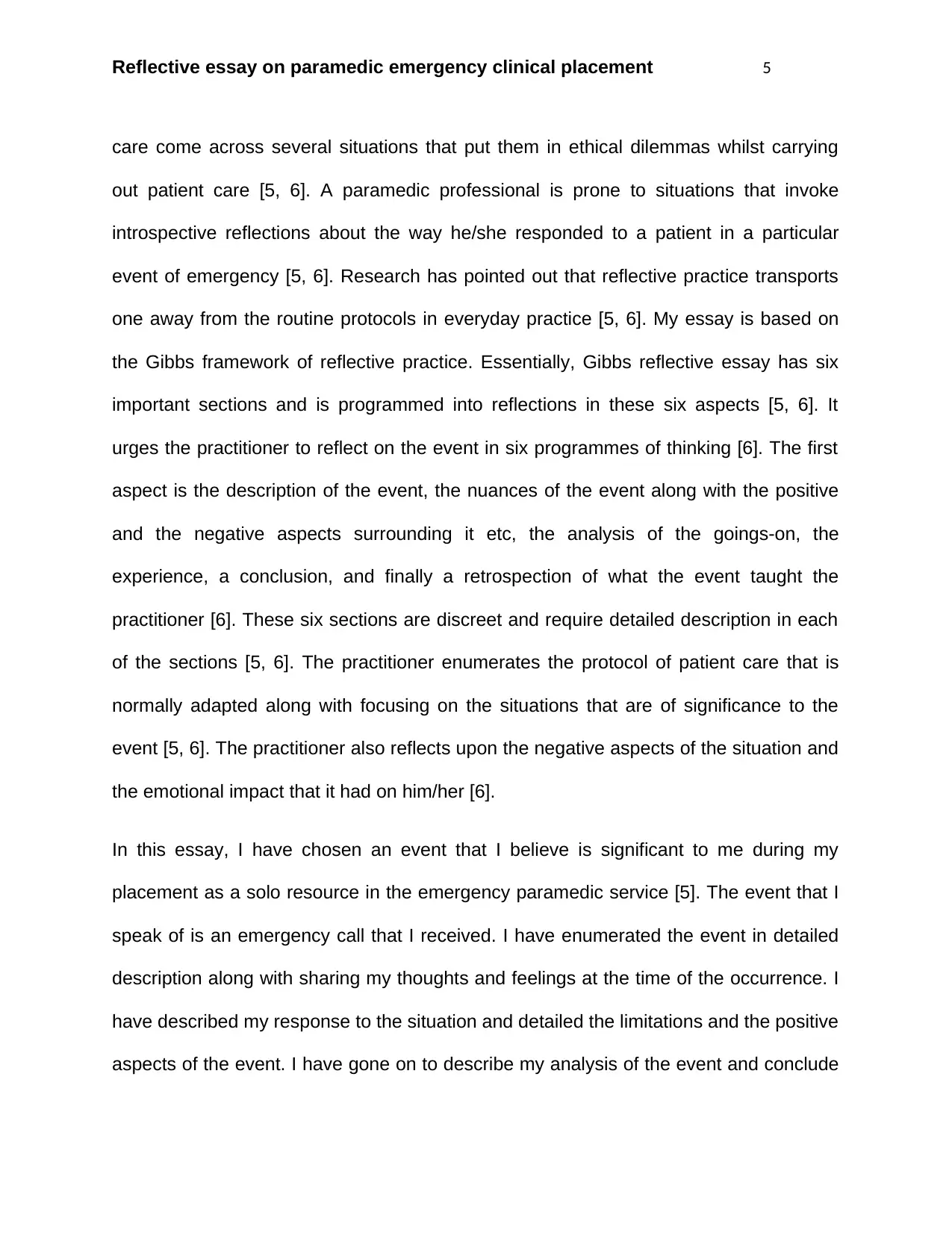
Reflective essay on paramedic emergency clinical placement 5
care come across several situations that put them in ethical dilemmas whilst carrying
out patient care [5, 6]. A paramedic professional is prone to situations that invoke
introspective reflections about the way he/she responded to a patient in a particular
event of emergency [5, 6]. Research has pointed out that reflective practice transports
one away from the routine protocols in everyday practice [5, 6]. My essay is based on
the Gibbs framework of reflective practice. Essentially, Gibbs reflective essay has six
important sections and is programmed into reflections in these six aspects [5, 6]. It
urges the practitioner to reflect on the event in six programmes of thinking [6]. The first
aspect is the description of the event, the nuances of the event along with the positive
and the negative aspects surrounding it etc, the analysis of the goings-on, the
experience, a conclusion, and finally a retrospection of what the event taught the
practitioner [6]. These six sections are discreet and require detailed description in each
of the sections [5, 6]. The practitioner enumerates the protocol of patient care that is
normally adapted along with focusing on the situations that are of significance to the
event [5, 6]. The practitioner also reflects upon the negative aspects of the situation and
the emotional impact that it had on him/her [6].
In this essay, I have chosen an event that I believe is significant to me during my
placement as a solo resource in the emergency paramedic service [5]. The event that I
speak of is an emergency call that I received. I have enumerated the event in detailed
description along with sharing my thoughts and feelings at the time of the occurrence. I
have described my response to the situation and detailed the limitations and the positive
aspects of the event. I have gone on to describe my analysis of the event and conclude
care come across several situations that put them in ethical dilemmas whilst carrying
out patient care [5, 6]. A paramedic professional is prone to situations that invoke
introspective reflections about the way he/she responded to a patient in a particular
event of emergency [5, 6]. Research has pointed out that reflective practice transports
one away from the routine protocols in everyday practice [5, 6]. My essay is based on
the Gibbs framework of reflective practice. Essentially, Gibbs reflective essay has six
important sections and is programmed into reflections in these six aspects [5, 6]. It
urges the practitioner to reflect on the event in six programmes of thinking [6]. The first
aspect is the description of the event, the nuances of the event along with the positive
and the negative aspects surrounding it etc, the analysis of the goings-on, the
experience, a conclusion, and finally a retrospection of what the event taught the
practitioner [6]. These six sections are discreet and require detailed description in each
of the sections [5, 6]. The practitioner enumerates the protocol of patient care that is
normally adapted along with focusing on the situations that are of significance to the
event [5, 6]. The practitioner also reflects upon the negative aspects of the situation and
the emotional impact that it had on him/her [6].
In this essay, I have chosen an event that I believe is significant to me during my
placement as a solo resource in the emergency paramedic service [5]. The event that I
speak of is an emergency call that I received. I have enumerated the event in detailed
description along with sharing my thoughts and feelings at the time of the occurrence. I
have described my response to the situation and detailed the limitations and the positive
aspects of the event. I have gone on to describe my analysis of the event and conclude
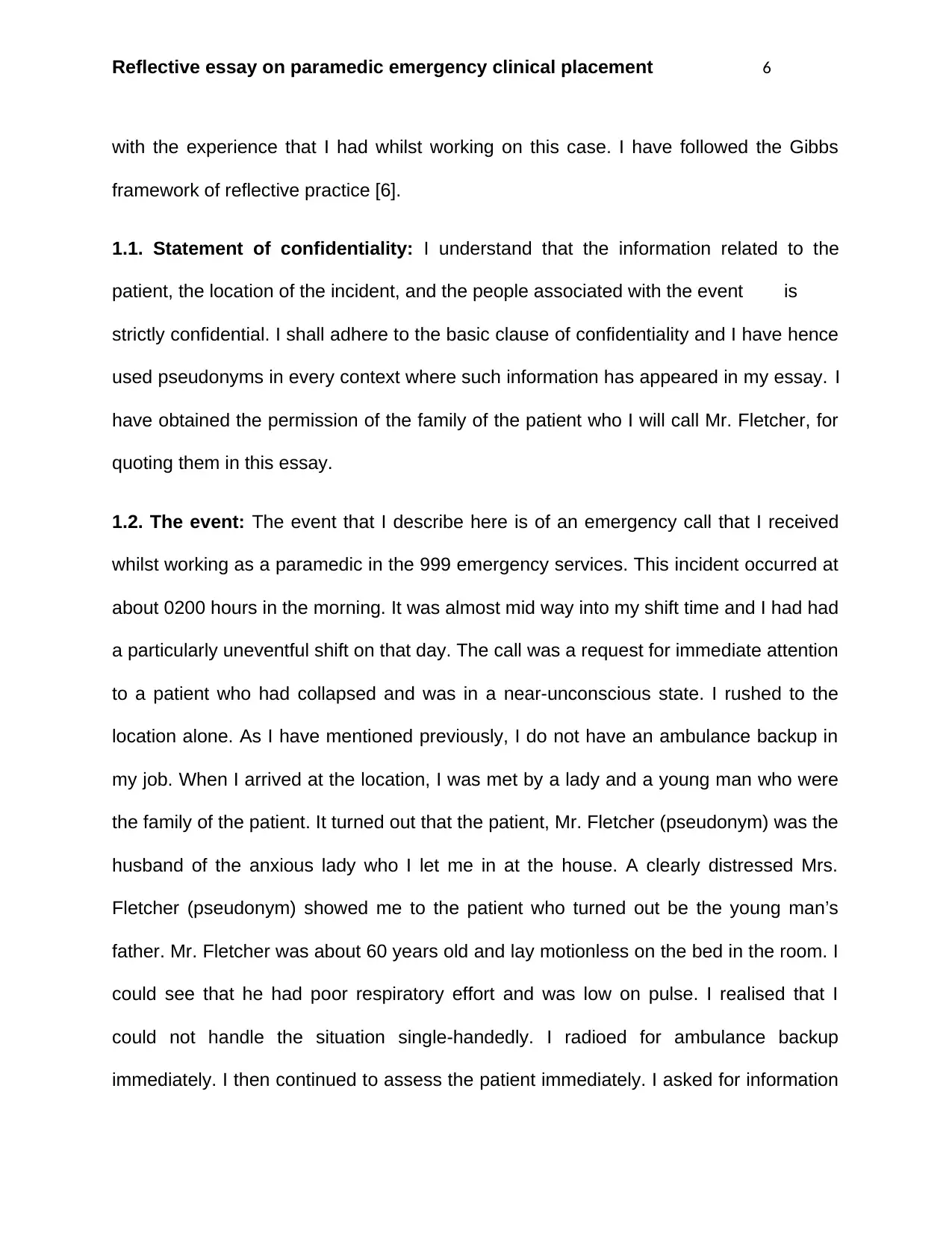
Reflective essay on paramedic emergency clinical placement 6
with the experience that I had whilst working on this case. I have followed the Gibbs
framework of reflective practice [6].
1.1. Statement of confidentiality: I understand that the information related to the
patient, the location of the incident, and the people associated with the event is
strictly confidential. I shall adhere to the basic clause of confidentiality and I have hence
used pseudonyms in every context where such information has appeared in my essay. I
have obtained the permission of the family of the patient who I will call Mr. Fletcher, for
quoting them in this essay.
1.2. The event: The event that I describe here is of an emergency call that I received
whilst working as a paramedic in the 999 emergency services. This incident occurred at
about 0200 hours in the morning. It was almost mid way into my shift time and I had had
a particularly uneventful shift on that day. The call was a request for immediate attention
to a patient who had collapsed and was in a near-unconscious state. I rushed to the
location alone. As I have mentioned previously, I do not have an ambulance backup in
my job. When I arrived at the location, I was met by a lady and a young man who were
the family of the patient. It turned out that the patient, Mr. Fletcher (pseudonym) was the
husband of the anxious lady who I let me in at the house. A clearly distressed Mrs.
Fletcher (pseudonym) showed me to the patient who turned out be the young man’s
father. Mr. Fletcher was about 60 years old and lay motionless on the bed in the room. I
could see that he had poor respiratory effort and was low on pulse. I realised that I
could not handle the situation single-handedly. I radioed for ambulance backup
immediately. I then continued to assess the patient immediately. I asked for information
with the experience that I had whilst working on this case. I have followed the Gibbs
framework of reflective practice [6].
1.1. Statement of confidentiality: I understand that the information related to the
patient, the location of the incident, and the people associated with the event is
strictly confidential. I shall adhere to the basic clause of confidentiality and I have hence
used pseudonyms in every context where such information has appeared in my essay. I
have obtained the permission of the family of the patient who I will call Mr. Fletcher, for
quoting them in this essay.
1.2. The event: The event that I describe here is of an emergency call that I received
whilst working as a paramedic in the 999 emergency services. This incident occurred at
about 0200 hours in the morning. It was almost mid way into my shift time and I had had
a particularly uneventful shift on that day. The call was a request for immediate attention
to a patient who had collapsed and was in a near-unconscious state. I rushed to the
location alone. As I have mentioned previously, I do not have an ambulance backup in
my job. When I arrived at the location, I was met by a lady and a young man who were
the family of the patient. It turned out that the patient, Mr. Fletcher (pseudonym) was the
husband of the anxious lady who I let me in at the house. A clearly distressed Mrs.
Fletcher (pseudonym) showed me to the patient who turned out be the young man’s
father. Mr. Fletcher was about 60 years old and lay motionless on the bed in the room. I
could see that he had poor respiratory effort and was low on pulse. I realised that I
could not handle the situation single-handedly. I radioed for ambulance backup
immediately. I then continued to assess the patient immediately. I asked for information
⊘ This is a preview!⊘
Do you want full access?
Subscribe today to unlock all pages.

Trusted by 1+ million students worldwide
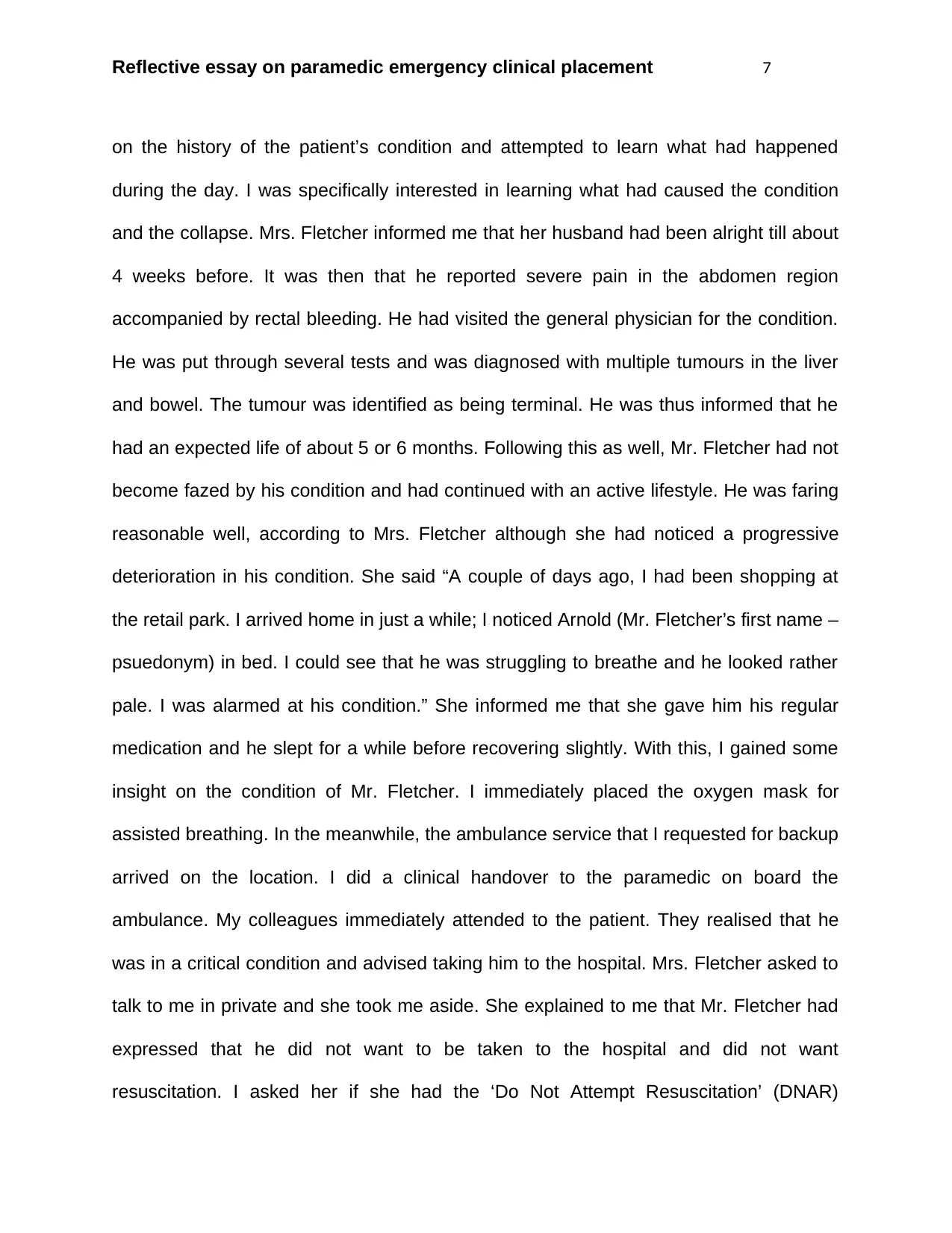
Reflective essay on paramedic emergency clinical placement 7
on the history of the patient’s condition and attempted to learn what had happened
during the day. I was specifically interested in learning what had caused the condition
and the collapse. Mrs. Fletcher informed me that her husband had been alright till about
4 weeks before. It was then that he reported severe pain in the abdomen region
accompanied by rectal bleeding. He had visited the general physician for the condition.
He was put through several tests and was diagnosed with multiple tumours in the liver
and bowel. The tumour was identified as being terminal. He was thus informed that he
had an expected life of about 5 or 6 months. Following this as well, Mr. Fletcher had not
become fazed by his condition and had continued with an active lifestyle. He was faring
reasonable well, according to Mrs. Fletcher although she had noticed a progressive
deterioration in his condition. She said “A couple of days ago, I had been shopping at
the retail park. I arrived home in just a while; I noticed Arnold (Mr. Fletcher’s first name –
psuedonym) in bed. I could see that he was struggling to breathe and he looked rather
pale. I was alarmed at his condition.” She informed me that she gave him his regular
medication and he slept for a while before recovering slightly. With this, I gained some
insight on the condition of Mr. Fletcher. I immediately placed the oxygen mask for
assisted breathing. In the meanwhile, the ambulance service that I requested for backup
arrived on the location. I did a clinical handover to the paramedic on board the
ambulance. My colleagues immediately attended to the patient. They realised that he
was in a critical condition and advised taking him to the hospital. Mrs. Fletcher asked to
talk to me in private and she took me aside. She explained to me that Mr. Fletcher had
expressed that he did not want to be taken to the hospital and did not want
resuscitation. I asked her if she had the ‘Do Not Attempt Resuscitation’ (DNAR)
on the history of the patient’s condition and attempted to learn what had happened
during the day. I was specifically interested in learning what had caused the condition
and the collapse. Mrs. Fletcher informed me that her husband had been alright till about
4 weeks before. It was then that he reported severe pain in the abdomen region
accompanied by rectal bleeding. He had visited the general physician for the condition.
He was put through several tests and was diagnosed with multiple tumours in the liver
and bowel. The tumour was identified as being terminal. He was thus informed that he
had an expected life of about 5 or 6 months. Following this as well, Mr. Fletcher had not
become fazed by his condition and had continued with an active lifestyle. He was faring
reasonable well, according to Mrs. Fletcher although she had noticed a progressive
deterioration in his condition. She said “A couple of days ago, I had been shopping at
the retail park. I arrived home in just a while; I noticed Arnold (Mr. Fletcher’s first name –
psuedonym) in bed. I could see that he was struggling to breathe and he looked rather
pale. I was alarmed at his condition.” She informed me that she gave him his regular
medication and he slept for a while before recovering slightly. With this, I gained some
insight on the condition of Mr. Fletcher. I immediately placed the oxygen mask for
assisted breathing. In the meanwhile, the ambulance service that I requested for backup
arrived on the location. I did a clinical handover to the paramedic on board the
ambulance. My colleagues immediately attended to the patient. They realised that he
was in a critical condition and advised taking him to the hospital. Mrs. Fletcher asked to
talk to me in private and she took me aside. She explained to me that Mr. Fletcher had
expressed that he did not want to be taken to the hospital and did not want
resuscitation. I asked her if she had the ‘Do Not Attempt Resuscitation’ (DNAR)
Paraphrase This Document
Need a fresh take? Get an instant paraphrase of this document with our AI Paraphraser
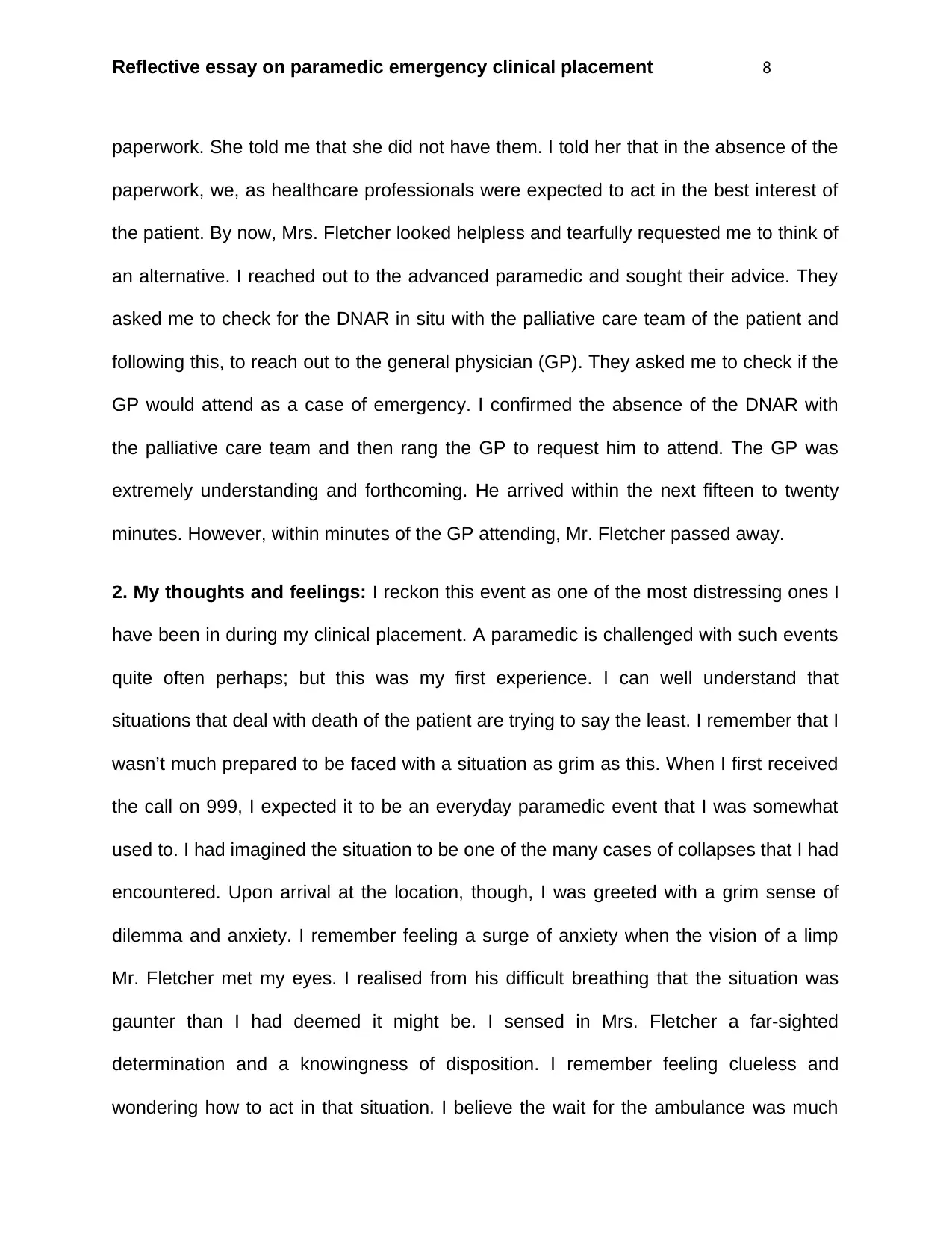
Reflective essay on paramedic emergency clinical placement 8
paperwork. She told me that she did not have them. I told her that in the absence of the
paperwork, we, as healthcare professionals were expected to act in the best interest of
the patient. By now, Mrs. Fletcher looked helpless and tearfully requested me to think of
an alternative. I reached out to the advanced paramedic and sought their advice. They
asked me to check for the DNAR in situ with the palliative care team of the patient and
following this, to reach out to the general physician (GP). They asked me to check if the
GP would attend as a case of emergency. I confirmed the absence of the DNAR with
the palliative care team and then rang the GP to request him to attend. The GP was
extremely understanding and forthcoming. He arrived within the next fifteen to twenty
minutes. However, within minutes of the GP attending, Mr. Fletcher passed away.
2. My thoughts and feelings: I reckon this event as one of the most distressing ones I
have been in during my clinical placement. A paramedic is challenged with such events
quite often perhaps; but this was my first experience. I can well understand that
situations that deal with death of the patient are trying to say the least. I remember that I
wasn’t much prepared to be faced with a situation as grim as this. When I first received
the call on 999, I expected it to be an everyday paramedic event that I was somewhat
used to. I had imagined the situation to be one of the many cases of collapses that I had
encountered. Upon arrival at the location, though, I was greeted with a grim sense of
dilemma and anxiety. I remember feeling a surge of anxiety when the vision of a limp
Mr. Fletcher met my eyes. I realised from his difficult breathing that the situation was
gaunter than I had deemed it might be. I sensed in Mrs. Fletcher a far-sighted
determination and a knowingness of disposition. I remember feeling clueless and
wondering how to act in that situation. I believe the wait for the ambulance was much
paperwork. She told me that she did not have them. I told her that in the absence of the
paperwork, we, as healthcare professionals were expected to act in the best interest of
the patient. By now, Mrs. Fletcher looked helpless and tearfully requested me to think of
an alternative. I reached out to the advanced paramedic and sought their advice. They
asked me to check for the DNAR in situ with the palliative care team of the patient and
following this, to reach out to the general physician (GP). They asked me to check if the
GP would attend as a case of emergency. I confirmed the absence of the DNAR with
the palliative care team and then rang the GP to request him to attend. The GP was
extremely understanding and forthcoming. He arrived within the next fifteen to twenty
minutes. However, within minutes of the GP attending, Mr. Fletcher passed away.
2. My thoughts and feelings: I reckon this event as one of the most distressing ones I
have been in during my clinical placement. A paramedic is challenged with such events
quite often perhaps; but this was my first experience. I can well understand that
situations that deal with death of the patient are trying to say the least. I remember that I
wasn’t much prepared to be faced with a situation as grim as this. When I first received
the call on 999, I expected it to be an everyday paramedic event that I was somewhat
used to. I had imagined the situation to be one of the many cases of collapses that I had
encountered. Upon arrival at the location, though, I was greeted with a grim sense of
dilemma and anxiety. I remember feeling a surge of anxiety when the vision of a limp
Mr. Fletcher met my eyes. I realised from his difficult breathing that the situation was
gaunter than I had deemed it might be. I sensed in Mrs. Fletcher a far-sighted
determination and a knowingness of disposition. I remember feeling clueless and
wondering how to act in that situation. I believe the wait for the ambulance was much
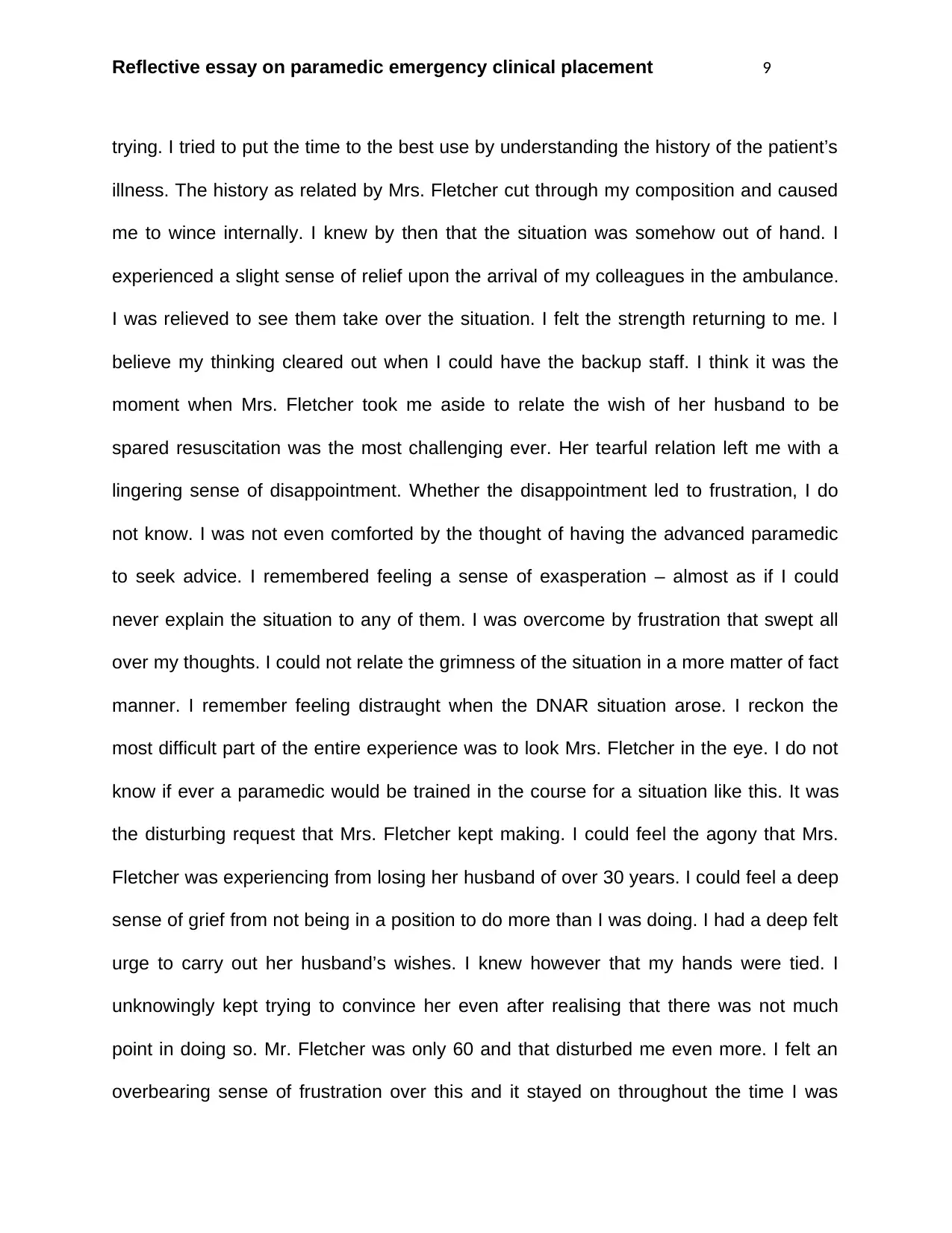
Reflective essay on paramedic emergency clinical placement 9
trying. I tried to put the time to the best use by understanding the history of the patient’s
illness. The history as related by Mrs. Fletcher cut through my composition and caused
me to wince internally. I knew by then that the situation was somehow out of hand. I
experienced a slight sense of relief upon the arrival of my colleagues in the ambulance.
I was relieved to see them take over the situation. I felt the strength returning to me. I
believe my thinking cleared out when I could have the backup staff. I think it was the
moment when Mrs. Fletcher took me aside to relate the wish of her husband to be
spared resuscitation was the most challenging ever. Her tearful relation left me with a
lingering sense of disappointment. Whether the disappointment led to frustration, I do
not know. I was not even comforted by the thought of having the advanced paramedic
to seek advice. I remembered feeling a sense of exasperation – almost as if I could
never explain the situation to any of them. I was overcome by frustration that swept all
over my thoughts. I could not relate the grimness of the situation in a more matter of fact
manner. I remember feeling distraught when the DNAR situation arose. I reckon the
most difficult part of the entire experience was to look Mrs. Fletcher in the eye. I do not
know if ever a paramedic would be trained in the course for a situation like this. It was
the disturbing request that Mrs. Fletcher kept making. I could feel the agony that Mrs.
Fletcher was experiencing from losing her husband of over 30 years. I could feel a deep
sense of grief from not being in a position to do more than I was doing. I had a deep felt
urge to carry out her husband’s wishes. I knew however that my hands were tied. I
unknowingly kept trying to convince her even after realising that there was not much
point in doing so. Mr. Fletcher was only 60 and that disturbed me even more. I felt an
overbearing sense of frustration over this and it stayed on throughout the time I was
trying. I tried to put the time to the best use by understanding the history of the patient’s
illness. The history as related by Mrs. Fletcher cut through my composition and caused
me to wince internally. I knew by then that the situation was somehow out of hand. I
experienced a slight sense of relief upon the arrival of my colleagues in the ambulance.
I was relieved to see them take over the situation. I felt the strength returning to me. I
believe my thinking cleared out when I could have the backup staff. I think it was the
moment when Mrs. Fletcher took me aside to relate the wish of her husband to be
spared resuscitation was the most challenging ever. Her tearful relation left me with a
lingering sense of disappointment. Whether the disappointment led to frustration, I do
not know. I was not even comforted by the thought of having the advanced paramedic
to seek advice. I remembered feeling a sense of exasperation – almost as if I could
never explain the situation to any of them. I was overcome by frustration that swept all
over my thoughts. I could not relate the grimness of the situation in a more matter of fact
manner. I remember feeling distraught when the DNAR situation arose. I reckon the
most difficult part of the entire experience was to look Mrs. Fletcher in the eye. I do not
know if ever a paramedic would be trained in the course for a situation like this. It was
the disturbing request that Mrs. Fletcher kept making. I could feel the agony that Mrs.
Fletcher was experiencing from losing her husband of over 30 years. I could feel a deep
sense of grief from not being in a position to do more than I was doing. I had a deep felt
urge to carry out her husband’s wishes. I knew however that my hands were tied. I
unknowingly kept trying to convince her even after realising that there was not much
point in doing so. Mr. Fletcher was only 60 and that disturbed me even more. I felt an
overbearing sense of frustration over this and it stayed on throughout the time I was
⊘ This is a preview!⊘
Do you want full access?
Subscribe today to unlock all pages.

Trusted by 1+ million students worldwide
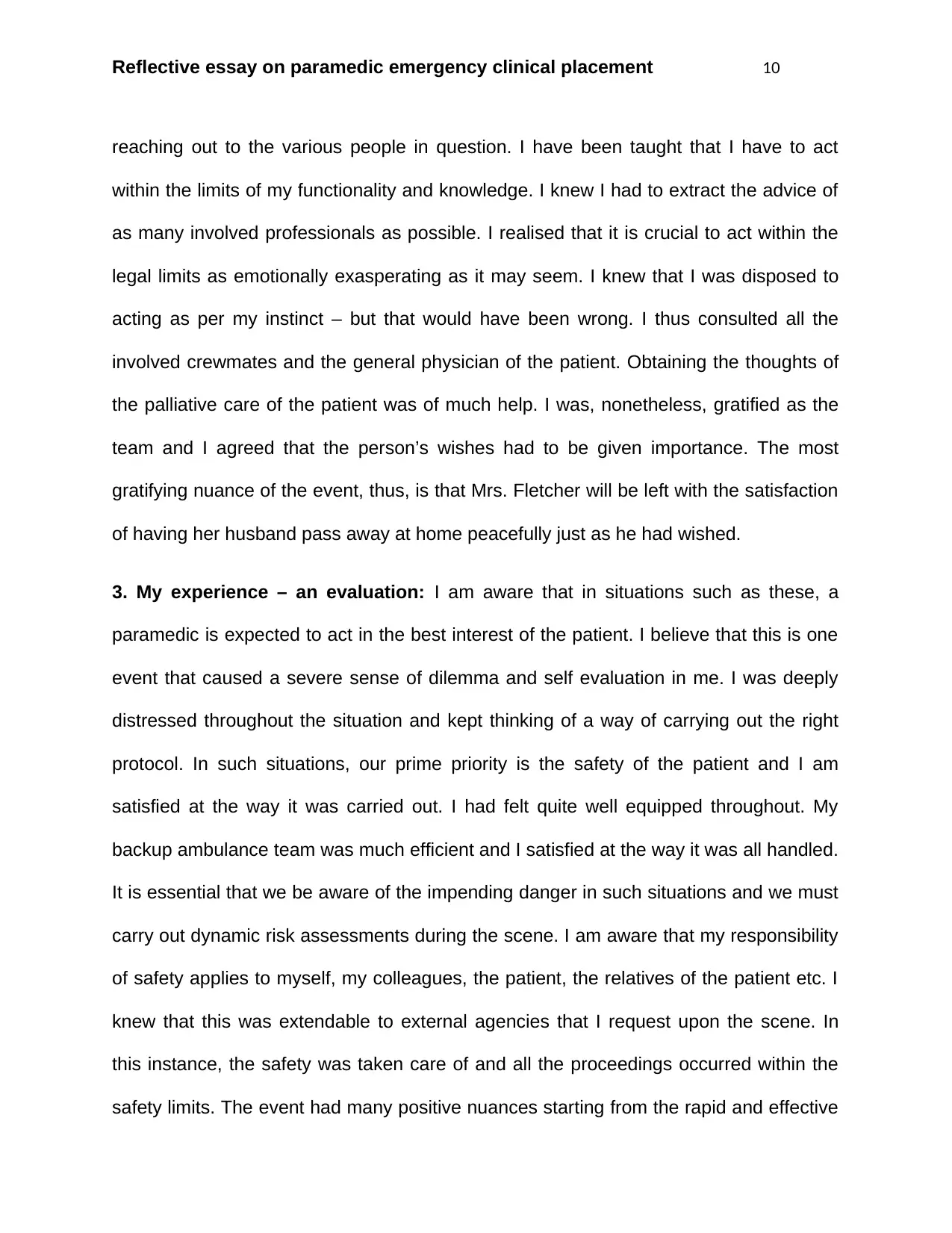
Reflective essay on paramedic emergency clinical placement 10
reaching out to the various people in question. I have been taught that I have to act
within the limits of my functionality and knowledge. I knew I had to extract the advice of
as many involved professionals as possible. I realised that it is crucial to act within the
legal limits as emotionally exasperating as it may seem. I knew that I was disposed to
acting as per my instinct – but that would have been wrong. I thus consulted all the
involved crewmates and the general physician of the patient. Obtaining the thoughts of
the palliative care of the patient was of much help. I was, nonetheless, gratified as the
team and I agreed that the person’s wishes had to be given importance. The most
gratifying nuance of the event, thus, is that Mrs. Fletcher will be left with the satisfaction
of having her husband pass away at home peacefully just as he had wished.
3. My experience – an evaluation: I am aware that in situations such as these, a
paramedic is expected to act in the best interest of the patient. I believe that this is one
event that caused a severe sense of dilemma and self evaluation in me. I was deeply
distressed throughout the situation and kept thinking of a way of carrying out the right
protocol. In such situations, our prime priority is the safety of the patient and I am
satisfied at the way it was carried out. I had felt quite well equipped throughout. My
backup ambulance team was much efficient and I satisfied at the way it was all handled.
It is essential that we be aware of the impending danger in such situations and we must
carry out dynamic risk assessments during the scene. I am aware that my responsibility
of safety applies to myself, my colleagues, the patient, the relatives of the patient etc. I
knew that this was extendable to external agencies that I request upon the scene. In
this instance, the safety was taken care of and all the proceedings occurred within the
safety limits. The event had many positive nuances starting from the rapid and effective
reaching out to the various people in question. I have been taught that I have to act
within the limits of my functionality and knowledge. I knew I had to extract the advice of
as many involved professionals as possible. I realised that it is crucial to act within the
legal limits as emotionally exasperating as it may seem. I knew that I was disposed to
acting as per my instinct – but that would have been wrong. I thus consulted all the
involved crewmates and the general physician of the patient. Obtaining the thoughts of
the palliative care of the patient was of much help. I was, nonetheless, gratified as the
team and I agreed that the person’s wishes had to be given importance. The most
gratifying nuance of the event, thus, is that Mrs. Fletcher will be left with the satisfaction
of having her husband pass away at home peacefully just as he had wished.
3. My experience – an evaluation: I am aware that in situations such as these, a
paramedic is expected to act in the best interest of the patient. I believe that this is one
event that caused a severe sense of dilemma and self evaluation in me. I was deeply
distressed throughout the situation and kept thinking of a way of carrying out the right
protocol. In such situations, our prime priority is the safety of the patient and I am
satisfied at the way it was carried out. I had felt quite well equipped throughout. My
backup ambulance team was much efficient and I satisfied at the way it was all handled.
It is essential that we be aware of the impending danger in such situations and we must
carry out dynamic risk assessments during the scene. I am aware that my responsibility
of safety applies to myself, my colleagues, the patient, the relatives of the patient etc. I
knew that this was extendable to external agencies that I request upon the scene. In
this instance, the safety was taken care of and all the proceedings occurred within the
safety limits. The event had many positive nuances starting from the rapid and effective
Paraphrase This Document
Need a fresh take? Get an instant paraphrase of this document with our AI Paraphraser
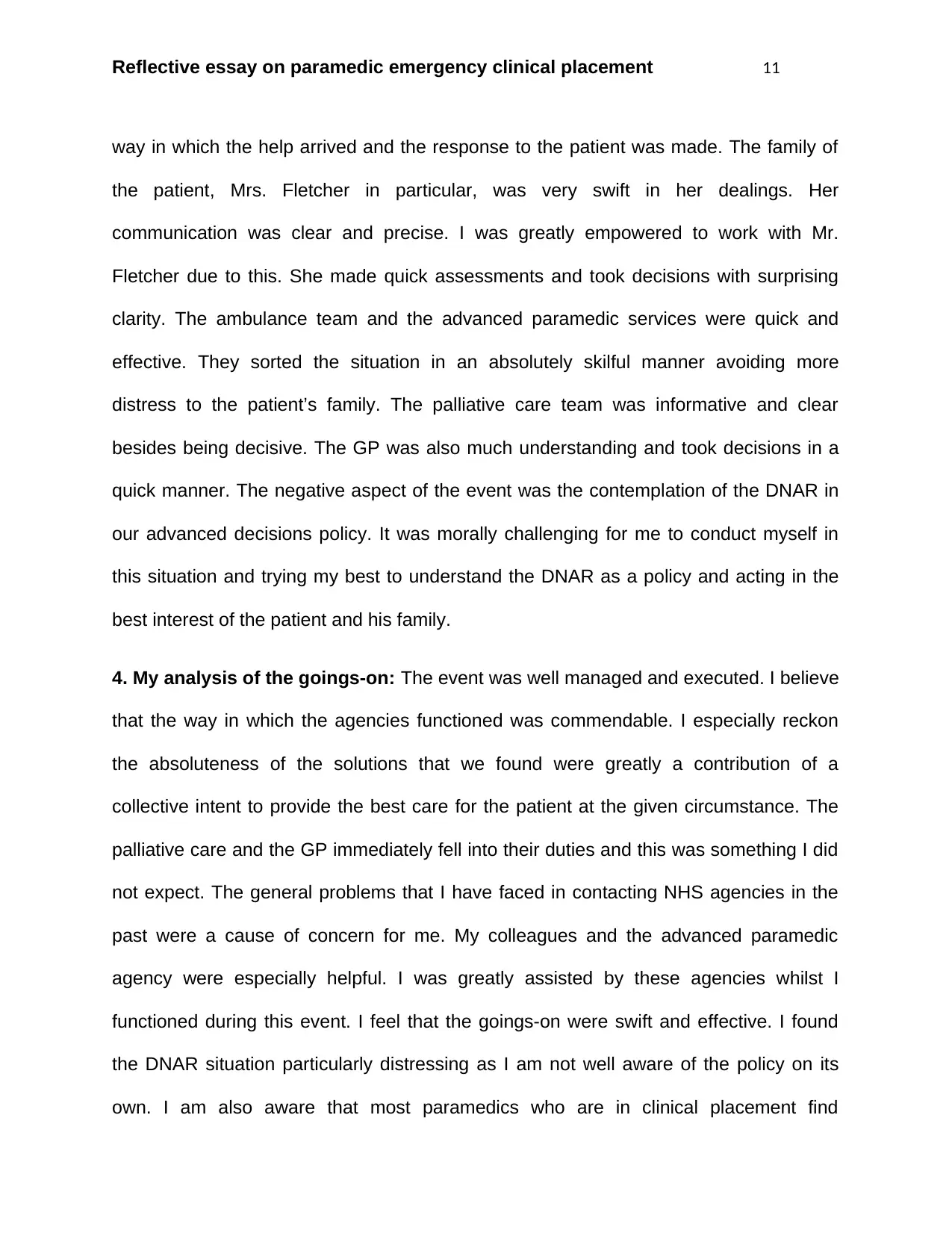
Reflective essay on paramedic emergency clinical placement 11
way in which the help arrived and the response to the patient was made. The family of
the patient, Mrs. Fletcher in particular, was very swift in her dealings. Her
communication was clear and precise. I was greatly empowered to work with Mr.
Fletcher due to this. She made quick assessments and took decisions with surprising
clarity. The ambulance team and the advanced paramedic services were quick and
effective. They sorted the situation in an absolutely skilful manner avoiding more
distress to the patient’s family. The palliative care team was informative and clear
besides being decisive. The GP was also much understanding and took decisions in a
quick manner. The negative aspect of the event was the contemplation of the DNAR in
our advanced decisions policy. It was morally challenging for me to conduct myself in
this situation and trying my best to understand the DNAR as a policy and acting in the
best interest of the patient and his family.
4. My analysis of the goings-on: The event was well managed and executed. I believe
that the way in which the agencies functioned was commendable. I especially reckon
the absoluteness of the solutions that we found were greatly a contribution of a
collective intent to provide the best care for the patient at the given circumstance. The
palliative care and the GP immediately fell into their duties and this was something I did
not expect. The general problems that I have faced in contacting NHS agencies in the
past were a cause of concern for me. My colleagues and the advanced paramedic
agency were especially helpful. I was greatly assisted by these agencies whilst I
functioned during this event. I feel that the goings-on were swift and effective. I found
the DNAR situation particularly distressing as I am not well aware of the policy on its
own. I am also aware that most paramedics who are in clinical placement find
way in which the help arrived and the response to the patient was made. The family of
the patient, Mrs. Fletcher in particular, was very swift in her dealings. Her
communication was clear and precise. I was greatly empowered to work with Mr.
Fletcher due to this. She made quick assessments and took decisions with surprising
clarity. The ambulance team and the advanced paramedic services were quick and
effective. They sorted the situation in an absolutely skilful manner avoiding more
distress to the patient’s family. The palliative care team was informative and clear
besides being decisive. The GP was also much understanding and took decisions in a
quick manner. The negative aspect of the event was the contemplation of the DNAR in
our advanced decisions policy. It was morally challenging for me to conduct myself in
this situation and trying my best to understand the DNAR as a policy and acting in the
best interest of the patient and his family.
4. My analysis of the goings-on: The event was well managed and executed. I believe
that the way in which the agencies functioned was commendable. I especially reckon
the absoluteness of the solutions that we found were greatly a contribution of a
collective intent to provide the best care for the patient at the given circumstance. The
palliative care and the GP immediately fell into their duties and this was something I did
not expect. The general problems that I have faced in contacting NHS agencies in the
past were a cause of concern for me. My colleagues and the advanced paramedic
agency were especially helpful. I was greatly assisted by these agencies whilst I
functioned during this event. I feel that the goings-on were swift and effective. I found
the DNAR situation particularly distressing as I am not well aware of the policy on its
own. I am also aware that most paramedics who are in clinical placement find
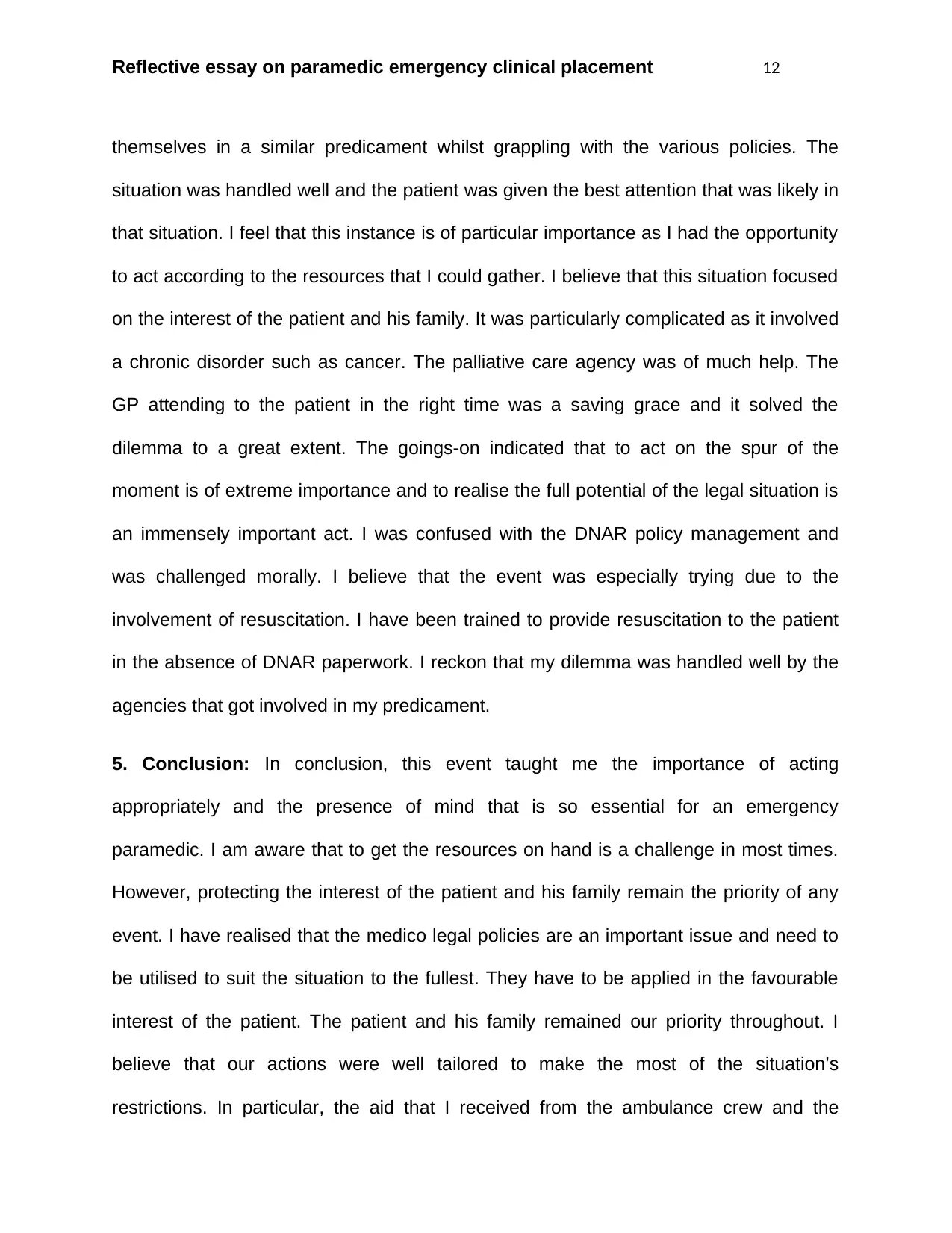
Reflective essay on paramedic emergency clinical placement 12
themselves in a similar predicament whilst grappling with the various policies. The
situation was handled well and the patient was given the best attention that was likely in
that situation. I feel that this instance is of particular importance as I had the opportunity
to act according to the resources that I could gather. I believe that this situation focused
on the interest of the patient and his family. It was particularly complicated as it involved
a chronic disorder such as cancer. The palliative care agency was of much help. The
GP attending to the patient in the right time was a saving grace and it solved the
dilemma to a great extent. The goings-on indicated that to act on the spur of the
moment is of extreme importance and to realise the full potential of the legal situation is
an immensely important act. I was confused with the DNAR policy management and
was challenged morally. I believe that the event was especially trying due to the
involvement of resuscitation. I have been trained to provide resuscitation to the patient
in the absence of DNAR paperwork. I reckon that my dilemma was handled well by the
agencies that got involved in my predicament.
5. Conclusion: In conclusion, this event taught me the importance of acting
appropriately and the presence of mind that is so essential for an emergency
paramedic. I am aware that to get the resources on hand is a challenge in most times.
However, protecting the interest of the patient and his family remain the priority of any
event. I have realised that the medico legal policies are an important issue and need to
be utilised to suit the situation to the fullest. They have to be applied in the favourable
interest of the patient. The patient and his family remained our priority throughout. I
believe that our actions were well tailored to make the most of the situation’s
restrictions. In particular, the aid that I received from the ambulance crew and the
themselves in a similar predicament whilst grappling with the various policies. The
situation was handled well and the patient was given the best attention that was likely in
that situation. I feel that this instance is of particular importance as I had the opportunity
to act according to the resources that I could gather. I believe that this situation focused
on the interest of the patient and his family. It was particularly complicated as it involved
a chronic disorder such as cancer. The palliative care agency was of much help. The
GP attending to the patient in the right time was a saving grace and it solved the
dilemma to a great extent. The goings-on indicated that to act on the spur of the
moment is of extreme importance and to realise the full potential of the legal situation is
an immensely important act. I was confused with the DNAR policy management and
was challenged morally. I believe that the event was especially trying due to the
involvement of resuscitation. I have been trained to provide resuscitation to the patient
in the absence of DNAR paperwork. I reckon that my dilemma was handled well by the
agencies that got involved in my predicament.
5. Conclusion: In conclusion, this event taught me the importance of acting
appropriately and the presence of mind that is so essential for an emergency
paramedic. I am aware that to get the resources on hand is a challenge in most times.
However, protecting the interest of the patient and his family remain the priority of any
event. I have realised that the medico legal policies are an important issue and need to
be utilised to suit the situation to the fullest. They have to be applied in the favourable
interest of the patient. The patient and his family remained our priority throughout. I
believe that our actions were well tailored to make the most of the situation’s
restrictions. In particular, the aid that I received from the ambulance crew and the
⊘ This is a preview!⊘
Do you want full access?
Subscribe today to unlock all pages.

Trusted by 1+ million students worldwide
1 out of 16
Related Documents
Your All-in-One AI-Powered Toolkit for Academic Success.
+13062052269
info@desklib.com
Available 24*7 on WhatsApp / Email
![[object Object]](/_next/static/media/star-bottom.7253800d.svg)
Unlock your academic potential
Copyright © 2020–2026 A2Z Services. All Rights Reserved. Developed and managed by ZUCOL.





